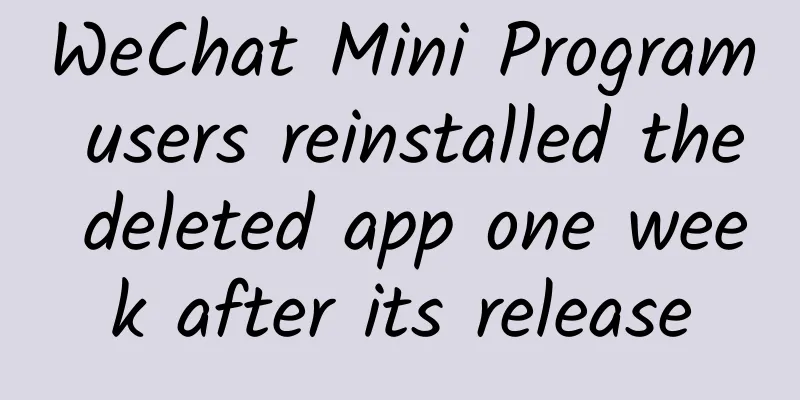WeChat Mini Program users reinstalled the deleted app one week after its release

|
On January 9, WeChat Mini Program was officially released. On the day of release, the argument of "APP extinction" followed. Users frantically studied how to play with Mini Program, and developers flocked to seek to publish their own application numbers in Mini Program. Even on the day of release, related technical websites had already advertised that they could perfectly develop program numbers for corporate use. However, after the carnival, there was a mess all over the floor. Some users who suffered from insufficient mobile phone memory happily uninstalled a large number of APPs that took up space, and then quietly installed the original APPs again after using Mini Programs. The poor experience made Mini Programs the target of public criticism. Even so, Mini Programs still caused a huge shock in the industry. Just a few days after the release of WeChat Mini Program, industry insiders revealed that Alipay of Alibaba Group also began to develop its own Mini Program system, determined to use Mini Programs to divide the APP application market. Relevant people said that the APP era created by Steve Jobs may be ended by Mini Programs in China. Although Mini Programs still have the problem of low user experience, the era of Mini Programs has begun. The mini program is not as good as expected After the official release of mini programs on January 9, users began to explore mini programs. Some apps with low usage were eliminated by users, but the performance of mini programs was not satisfactory. First of all, users complained that "it was different from what was promised. The mini program applications that should have appeared in the discovery column were not there at all. If it was not recommended by an acquaintance, I couldn't find how to use it." The use of mini programs is not simple. A few days after the launch, many users could not use mini programs directly. Secondly, the search function of mini programs has low recognition ability. It can only perform precise searches, not related searches. Even some "mini programs" cannot be recognized even if they are one word short, and related applications cannot be found. Thirdly, there are too few mini program developers at present. Many high-frequency applications cannot be searched, and there are few applications in each category. Moreover, the applications of companies such as WeChat's "competitors" and Tencent's "competitors" did not appear in the list of mini programs. For example, Ali's Alipay and Tencent's own social software QQ are not available. Finally, among the mini programs that can be used, although the overall performance is smooth and the basic application functions are complete, there are still many bugs in the details. Stuttering and flashbacks occur frequently. The login interface of some mini programs cannot obtain the verification code, resulting in inability to log in. If the above experience is still a technical problem of the corresponding mini program developers, the optimization of the mini program itself is not satisfactory. For example, if the mini program is placed at the top of the chat, it cannot be revoked. This irreversible use experience greatly reduces the installation rate of the mini program. In addition, in some mini programs that require the use of positioning, if positioning is not allowed, the interface will pop up repeatedly, the mini program cannot be exited, and it cannot return to WeChat. Users can only force WeChat to solve the problem. At present, both the WeChat mini program team and the application development team are in the exploration stage for this new function, and the WeChat mini program itself still has a lot of room for optimization. Even if the optimization-related problems and bug problems are perfectly solved, the simplified attributes of the mini program itself have greatly reduced the functionality of many APPs. In some shopping mini programs, there are only search and order functions, which are completely inconsistent with the user's online shopping habits; some discount applications cannot be used in mini programs; some information mini programs only have the option of browsing news, and the inability to share and comment also makes the information application lose some of its social attribute advantages. The most important thing is that when announcing the release of the mini program, WeChat originally wanted to create a lightweight and quiet application platform. However, through searching, it was found that related applications had already begun to be promoted on the mini program, earning traffic through clicks and usage. WeChat’s original idea of building a pure application platform may only be a beautiful concept. Why did the release of the mini program cause an "earthquake"? From Zhang Xiaolong’s announcement in early 2016 that WeChat would develop mini-programs, to the push of mini-program development experience qualifications on September 22, 2016, to the official launch of mini-programs on January 9 this year, every mini-program-related development will cause extensive discussions and industry “earthquakes” inside and outside the industry. Subsequently, Alipay of the Alibaba Group also revealed to industry insiders that it would develop related mini-programs. So far, the three dominant companies in China’s Internet industry, BAT, have all made some moves on mini-programs. However, the three BAT companies have different endings. Baidu, as the first company to propose similar mini-program applications, has already died in the womb with its “light application”. Every step of WeChat’s mini-program information has received attention from both inside and outside the industry. It can be predicted that every step of Alipay’s mini-program development will receive the same level of attention in the future. Why do BAT, as China’s Internet giants, have a strong interest in lightweight application platforms such as mini-programs? First of all, the birth of mini programs is actually subject to the limitations of hardware. Almost everyone or their friends are troubled by "insufficient memory" and "cleaning up space". Mini programs, such as light applications, came into being. The properties of light application platforms can solve the problem of users installing too many apps and occupying a lot of memory; secondly, with the development of technology, the emergence of light application platforms such as mini programs is also the result of scientific and technological progress. Modern people are increasingly pursuing simplicity and convenience. Some applications are not used frequently, but users have to install an APP for this purpose, and even have to clean up specially after use to save space. This process is very inconvenient. The good aggregation properties of this light application of mini programs can meet the requirements of most users' APPs using one platform, which is simple and convenient for users; finally, although there are still many problems in the use of the mini program ecosystem and related application development, WeChat has a taste of "the old man's intention is not the wine". According to the current properties of mini programs, the platform is an open platform and does not have any profit attributes. From the previous introduction of WeChat, it can be seen that the mini program is not an intuitively profitable project. WeChat hopes to form an ecosystem of users on WeChat through the mini platform. On the one hand, the development cost of WeChat can be reduced with the help of mini programs; on the other hand, user stickiness can be increased, and the online and offline ecosystems using WeChat can be combined to form new value. This is the greatest value of the birth of mini programs. Looking at the current technology and Internet companies, from Apple, Xiaomi, LeTV, Meizu, Huawei to Tencent, Alibaba, Baidu and other large Internet technology companies are all building their own ecosystems and establishing a full-dimensional three-dimensional industrial chain system. For Internet companies, there are no technology companies like Apple and Xiaomi that use hardware to carry their own ecosystems. At the same time, the cost and time spent by a team of Internet companies to develop an application are too long. If you want to build your own ecosystem, it will take at least three to five years to fully cover users' food, clothing, housing, transportation, etc. Mini programs can perfectly solve this problem. The corresponding application team will develop mini programs by themselves. WeChat only needs to provide the existing basic user base without the risk of being snatched away, and it can obtain a full-scale Internet ecosystem. Whether it is for WeChat or the application team using mini programs, it is the best acceptable result. This is also the reason why BAT will focus on the light application platform. Mini Programs will not impact APPs in the short term When mini programs were first proposed, there was a view that WeChat's mini programs would become "APP killers" and could compete with APPs from the very beginning. However, from the current perspective, this argument is still premature. After experiencing mini programs, many users quietly reinstalled the apps they had deleted. It can be seen that, at present, mini programs can replace some low-frequency, relatively simple functional APP applications, but for complex, high-frequency APPs, mini programs are not yet competitive, and it is obviously impossible to replace APPs. Moreover, from the perspective of the layout of mini programs, it is more suitable as an application scenario function for offline use rather than a main application collection. Mini Programs currently exist as an ecosystem between APPs and public accounts, so they will not pose a threat to traditional APPs in the short term. Mini Programs are just a new attempt by WeChat or Tencent to construct its own ecological environment and combine commercial value through this Internet ecology. The emergence of Mini Programs is an extension of WeChat's offline life, allowing users to open WeChat and use WeChat in more scenarios. Similar to WeChat Pay, it will make outstanding contributions to Tencent's future economy and Internet ecology. However, as users wish, the era of saying goodbye to "insufficient memory" and "clearing space" on mobile phones is still a bit far away, so even with Mini Programs, don't rush to clean up those commonly used APPs. As a winner of Toutiao's Qingyun Plan and Baijiahao's Bai+ Plan, the 2019 Baidu Digital Author of the Year, the Baijiahao's Most Popular Author in the Technology Field, the 2019 Sogou Technology and Culture Author, and the 2021 Baijiahao Quarterly Influential Creator, he has won many awards, including the 2013 Sohu Best Industry Media Person, the 2015 China New Media Entrepreneurship Competition Beijing Third Place, the 2015 Guangmang Experience Award, the 2015 China New Media Entrepreneurship Competition Finals Third Place, and the 2018 Baidu Dynamic Annual Powerful Celebrity. |
Recommend
Drinking alcohol and getting red on the face! Is the "Asian flush" an evolutionary "defect"?
Leviathan Press: Do you get flushed when you drin...
Deep Blue S7 launches new 520Pro pure electric version, a more worthwhile pure electric SUV, priced at 179,900 yuan
According to the official news of Deep Blue Auto,...
How to operate and promote Weibo? 5 tips for Weibo operation and promotion!
Weibo's business model is already quite matur...
How do brands plan their video account matrix?
Recently, we have observed that many brands have ...
In some places in Hainan, this tree is more famous than the coconut tree →
Walking in Hainan, you can see coconut trees ever...
Severe crackdown! Why was the tiny earthworm included in the Central Government’s No. 1 document?
Recently, the release of the 2023 Central Documen...
The whole story of the closure of subtitle websites
On the night of November 22, the well-known subti...
Besides hot pot, what else can mushrooms be used for?
Produced by: Science Popularization China Author:...
It's like a long-distance relationship
More than two thousand years ago, Mozi wrote in &...
South Korean lawmaker says gaming industry suffers 5.5 billion yuan in annual losses from Chinese capital
Recently, South Korean Congressman Jeon Byung-hun ...
TV series explained in small pictures: teaching the creation process of film, television and animation commentary copywriting from 0 to 1, 1 million fans in 4 months
Small pictures of TV series: Teaching the creatio...
[Scholars from the Saiwai] 20220528 How to build a complete selling point system (Part 1) + Prediction and midday review before next week's market opening
[Saiwai Scholar] 20220528 How to build a complete...
Chart丨Collection! Two Sessions Knowledge Handbook
Planning: Zhang Weige, Li Zhen Produced by: Qin Y...
Understand at a glance: Should we get the “fourth shot” of the new coronavirus vaccine?
Vaccination with the new coronavirus vaccine can ...
8 insights from Douyin e-commerce new brand growth report
The new consumption track in the past two years h...









